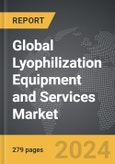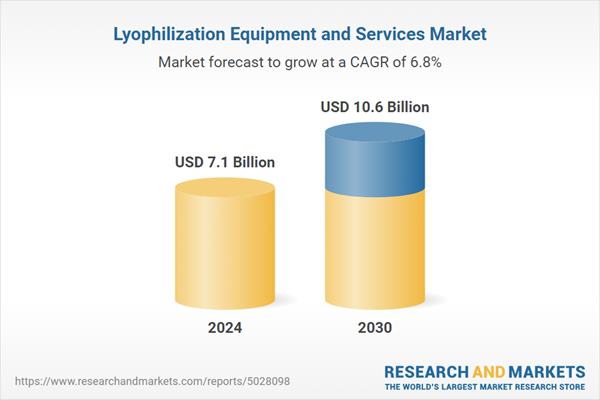Lyophilization Equipment and Services Market - Key Trends & Drivers Summarized
What Is Lyophilization and How Is It Transforming Product Stability?
Lyophilization, or freeze-drying, is a dehydration process used primarily for preserving perishable materials, thereby extending their shelf life and easing transportation and storage. This technique involves freezing the product, reducing the surrounding pressure, and then removing the ice by sublimation, which transforms it directly from solid to gas. Lyophilization is critical in the pharmaceutical industry where it's used to increase the stability of medications and biologicals, including vaccines, which are sensitive to heat and moisture. Beyond pharmaceuticals, lyophilization is employed in food processing to produce lightweight, long-lasting products that retain flavor and nutritional value better than those processed by conventional drying methods. The precise control over processing conditions ensures that the structural integrity and bioactivity of sensitive substances are meticulously preserved, making lyophilization an indispensable technique in the production of high-quality products.How Are Technological Advancements Shaping the Lyophilization Equipment Market?
Technological advancements are pivotal in enhancing the efficiency and capability of lyophilization equipment. Modern freeze-dryers are equipped with advanced features like automated loading and unloading systems, improved vacuum technology, and sophisticated monitoring and control systems that ensure product consistency and process repeatability. These technologies not only optimize the lyophilization process but also reduce the risk of human error and enhance scalability. The integration of smart sensors and IoT capabilities allows for real-time data monitoring and analytics, enabling operators to make informed adjustments to optimize the drying process. These advancements contribute to reducing processing times and energy consumption, enhancing the overall sustainability of the process, and complying with stringent regulatory standards for pharmaceutical and food products.What Challenges and Opportunities Are Present in the Lyophilization Services Market?
The lyophilization services market faces unique challenges and opportunities driven by the increasing complexity of pharmaceutical formulations and a growing need for stability in biological products. As biopharmaceuticals, including vaccines and biologics, become more prevalent, the demand for custom lyophilization services that can handle complex, sensitive products is rising. These services must not only provide state-of-the-art equipment but also expertise in cycle development and optimization to ensure product efficacy and compliance with global health regulations. However, the high cost of establishing and maintaining advanced lyophilization facilities poses a significant barrier to entry for many firms, thereby heightening the competition among established service providers. Despite these challenges, the outsourcing of lyophilization processes by pharmaceutical companies presents substantial opportunities for growth in this sector, driven by the need to reduce costs, increase production flexibility, and focus on core competencies.Growth in the Lyophilization Equipment and Services Market Is Driven by Several Factors
The growth in the lyophilization equipment and services market is driven by several factors, reflecting a complex landscape of evolving pharmaceutical needs, technological innovations, and regulatory requirements. The rising demand for biopharmaceuticals, including personalized medicines and advanced biological therapies, requires robust lyophilization solutions to ensure product stability and shelf-life. Technological advancements that offer enhanced automation, improved energy efficiency, and integrated process controls are key drivers, making lyophilization processes more reliable and cost-effective. Additionally, the global expansion of the food processing industry and the increasing adoption of freeze-dried products contribute to the market's growth. Regulatory pressures to maintain high safety and quality standards in pharmaceutical and food products also necessitate the adoption of advanced lyophilization techniques. Together, these dynamics ensure sustained demand for sophisticated lyophilization solutions in both equipment and services sectors.Report Scope
The report analyzes the Lyophilization Equipment and Services market, presented in terms of market value (USD). The analysis covers the key segments and geographic regions outlined below.- Segments: Type (Tray Lyophilizers, Bench-Top Lyophilizers, Rotary Lyophilizers, Freeze Drying Microscopes); End-Use (Pharmaceuticals, Biopharmaceutical, Diagnostics, Nutraceuticals).
- Geographic Regions/Countries: World; United States; Canada; Japan; China; Europe (France; Germany; Italy; United Kingdom; Spain; Russia; and Rest of Europe); Asia-Pacific (Australia; India; South Korea; and Rest of Asia-Pacific); Latin America (Argentina; Brazil; Mexico; and Rest of Latin America); Middle East (Iran; Israel; Saudi Arabia; United Arab Emirates; and Rest of Middle East); and Africa.
Key Insights:
- Market Growth: Understand the significant growth trajectory of the Tray Lyophilizers segment, which is expected to reach US$5 Billion by 2030 with a CAGR of 6.3%. The Bench-Top Lyophilizers segment is also set to grow at 6.6% CAGR over the analysis period.
- Regional Analysis: Gain insights into the U.S. market, valued at $1.9 Billion in 2024, and China, forecasted to grow at an impressive 9.9% CAGR to reach $2.5 Billion by 2030. Discover growth trends in other key regions, including Japan, Canada, Germany, and the Asia-Pacific.
Why You Should Buy This Report:
- Detailed Market Analysis: Access a thorough analysis of the Global Lyophilization Equipment and Services Market, covering all major geographic regions and market segments.
- Competitive Insights: Get an overview of the competitive landscape, including the market presence of major players across different geographies.
- Future Trends and Drivers: Understand the key trends and drivers shaping the future of the Global Lyophilization Equipment and Services Market.
- Actionable Insights: Benefit from actionable insights that can help you identify new revenue opportunities and make strategic business decisions.
Key Questions Answered:
- How is the Global Lyophilization Equipment and Services Market expected to evolve by 2030?
- What are the main drivers and restraints affecting the market?
- Which market segments will grow the most over the forecast period?
- How will market shares for different regions and segments change by 2030?
- Who are the leading players in the market, and what are their prospects?
Report Features:
- Comprehensive Market Data: Independent analysis of annual sales and market forecasts in US$ Million from 2024 to 2030.
- In-Depth Regional Analysis: Detailed insights into key markets, including the U.S., China, Japan, Canada, Europe, Asia-Pacific, Latin America, Middle East, and Africa.
- Company Profiles: Coverage of players such as August Bioservices, Berkshire Sterile Manufacturing, LSNE Contract Manufacturing, Lyophilization Technology, Inc., Oregon Freeze Dry, Inc. and more.
- Complimentary Updates: Receive free report updates for one year to keep you informed of the latest market developments.
Some of the 12 companies featured in this Lyophilization Equipment and Services market report include:
- August Bioservices
- Berkshire Sterile Manufacturing
- LSNE Contract Manufacturing
- Lyophilization Technology, Inc.
- Oregon Freeze Dry, Inc.
- Pharmaceutics International, Inc.
- PYRAMID Laboratories, Inc.
- W. L. Gore & Associates, Inc.
This edition integrates the latest global trade and economic shifts into comprehensive market analysis. Key updates include:
- Tariff and Trade Impact: Insights into global tariff negotiations across 180+ countries, with analysis of supply chain turbulence, sourcing disruptions, and geographic realignment. Special focus on 2025 as a pivotal year for trade tensions, including updated perspectives on the Trump-era tariffs.
- Adjusted Forecasts and Analytics: Revised global and regional market forecasts through 2030, incorporating tariff effects, economic uncertainty, and structural changes in globalization. Includes historical analysis from 2015 to 2023.
- Strategic Market Dynamics: Evaluation of revised market prospects, regional outlooks, and key economic indicators such as population and urbanization trends.
- Innovation & Technology Trends: Latest developments in product and process innovation, emerging technologies, and key industry drivers shaping the competitive landscape.
- Competitive Intelligence: Updated global market share estimates for 2025, competitive positioning of major players (Strong/Active/Niche/Trivial), and refined focus on leading global brands and core players.
- Expert Insight & Commentary: Strategic analysis from economists, trade experts, and domain specialists to contextualize market shifts and identify emerging opportunities.
Table of Contents
Companies Mentioned (Partial List)
A selection of companies mentioned in this report includes, but is not limited to:
- August Bioservices
- Berkshire Sterile Manufacturing
- LSNE Contract Manufacturing
- Lyophilization Technology, Inc.
- Oregon Freeze Dry, Inc.
- Pharmaceutics International, Inc.
- PYRAMID Laboratories, Inc.
- W. L. Gore & Associates, Inc.
Table Information
| Report Attribute | Details |
|---|---|
| No. of Pages | 279 |
| Published | January 2026 |
| Forecast Period | 2024 - 2030 |
| Estimated Market Value ( USD | $ 7.1 Billion |
| Forecasted Market Value ( USD | $ 10.6 Billion |
| Compound Annual Growth Rate | 6.8% |
| Regions Covered | Global |









